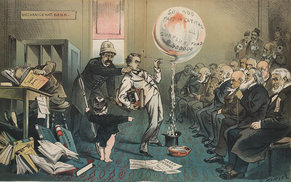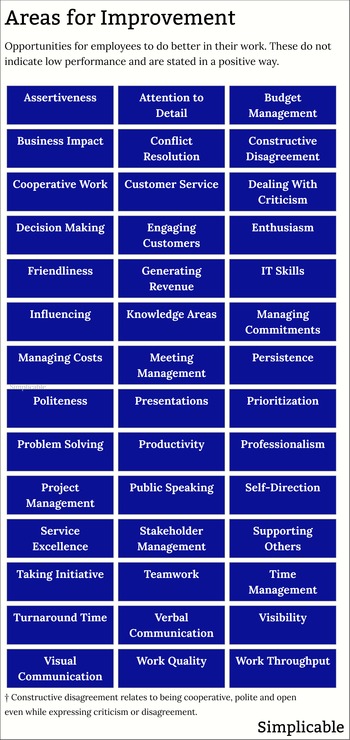
Ambition
The motivation to do something with your life and the resources around you. Values related to ambition describe your mission, vision for the future and standards for behavior that you set for yourself or team.The principle that you will experiment with brave ideas to take leaps forward. | |
Greatness | Values related to overcoming mediocrity to do something that stands out. |
The principle that you work hard. | |
The principle that art is its own reward and needs no further justification. For example, a photographer who takes great photographs to take great photographs. | |
Values related to outcompeting such as Vince Lombardi's "Winning isn’t everything, but wanting to win is.” | |
Principles related to aggressive change such as challenging the status quo. | |
Taking the lead as an individual, firm, group or society. | |
Selflessness | Acting in the interests of the greater good. |
An issue, principle or goal that drives everything you do. | |
Identity | Defining you are or who you're not as an individual or organization. For example, Google's famous "Don't be evil" in its code of conduct. |
Spirituality & Character | Personal values often relate to spirituality and character. |
Creativity related values such as the principle of preserving ambiguity whereby you avoid jumping to conclusions too early. | |
Passion | Professing a passion for your work or mission. |
Courage | A pledge to be courageous in the face of problems, risk and uncertainty. |
Speed | The principle that speed is important to your work. |
Growth | Investing in the future to grow. |
Taking calculated risks. | |
Resilience to stresses both at the personal level or as a society or organization. | |
Failure | Values related to learning from failure and continuing without loss of enthusiasm. |
Performance
Performance values are principles related to your day-to-day work and results. They are often a promise for the value you will offer.Reliability | A principle related to reliability such as an insurance agent who is always available when a customer has a problem. |
Diligence | A commitment to direct your full energy and concentration towards work. |
Productivity such as the principle that a firm automates toil. | |
Values related to waste and efficiency such as a firm that is commits to continually reduce wasted time, effort, materials, transport and energy. | |
A duty such as due diligence, fidelity or fiduciary duty. | |
The principle that a firm conforms to the norms and expectations of a profession. For example, a sales team that values personal appearance and respect for the customer. | |
Confidentiality | Values related to the privacy of information. |
Integrity such as honesty above all else. | |
A commitment to quality. This takes many forms such as a fruit stand that values freshness or mechanic who always double checks every aspect of a repair. | |
Focus | Defining an obsession that you value such as a snowboarding firm that values complete immersion in the sport and its culture. |
Security | A commitment to physical and information security to protect your stakeholders from harm. |
Reputation | Directly valuing your reputation such that you act ethically and to the expectations of your stakeholders. |
The principle that you won't hide information that stakeholders such as investors, customers and employees need to know. | |
Valuing mastery typically means an obsession with perfection such that you refuse to move on until something is right. | |
The belief that gradual but ongoing change is important to your work. | |
Health & Safety | Prioritization of health and safety in all that you do. For example, an airline that prioritizes safety over schedules, costs and all other concerns. |
Experience
Defining how you want to experience life or experiences that you want to create for others.Adventure | Valuing the usual, exciting and magical. |
Learning | A commitment to learning and/or teaching. |
Simplicity | The belief that it is best to keep things as simple as possible. |
Simplicity isn't necessarily better than complexity and some individuals and firms will adopt principles that favor complexity such as more is more or more is different. | |
Pursuit of style. For example, an architect who values an aesthetic ideal such as truth to materials. | |
A passion for making things that are pleasing and productive to use. | |
Not taking yourself too seriously. | |
Valuing communicating such that you aim to become a storyteller. | |
Values related to knowledge such as a belief in freedom of speech and expression. | |
Not faking it. For example, a travel guide who claims to be passionate about adventure who actually is exceptionally adventurous. | |
Stability | It is common for people to value stability. Promises of stability are common in corporate values and marketing messages. For example, a vineyard that values tradition such that it hasn't changed its production methods for 90 years. |
Comfort & Convenience | It is well known that comfort and convenience sell as customers often take the path of least resistance. As such, it is common for firms to establish values such as "we are the easiest to do business with." |
Valuing social status such as fame or brand image. | |
Happiness | Valuing your own happiness or your ability to make others happy. |
Pursuit of experiences that are memorable, meaningful, thrilling or deeply moving. |
People
Values for how you treat people and what you seek from social and business relationships.Valuing the process of working as a team. | |
Caring about the people around you. | |
Connectedness | Valuing social interaction and connection. |
Lead by Example | The principle of letting your results speak as opposed to saying one thing and doing another. |
Actively being honest and forthright. | |
Celebrate Successes | The belief that there is a time for work and a time to celebrate the fruits of your labor. |
Making positive assumptions about people and not lightly accusing them of wrong doing. | |
Good Will | Treating others with fairness and generosity. |
The belief that the differences between people, including ideological differences, are a good thing to be celebrated and welcomed. | |
The belief that arguments and disagreements are a constructive and valuable process. | |
The recognition that many things are outside your control such that you can't go it alone. For example, the acknowledgement that you depend on the good will of those around you. | |
Listening | The principle that everyone deserves your attention when they speak to you. |
Trust | Principles related to trust. Such as the values of an honor system that place great trust in members of a group. |
Community Involvement | The belief that you should expand your involvement beyond your immediate business to play a role in the greater community. |
Recognition | The principle of recognizing the improvements and accomplishments of others. |
Politeness | Affording those around you with basic respect and courtesies. |
Fairness & Stewardship
Fairness to communities and stewardship of resources.The principle that people are rewarded and positioned according to their abilities and accomplishments. | |
Treating people equally without difference to factors such as race, ethnicity, religion, age, gender, sexual orientation, disability and political views. | |
Pursuit of the truth as your singular motivation. | |
Taking responsibility for yourself and your organization. For example, cleaning up any environmental damage caused by your operations. | |
Taking the blame when things go wrong for any area under your authority or influence. | |
Openness | Sharing information and resources. For example, a researcher who discovers a cure that will save countless people who shares it with the world for free. |
Making things accessible to the greatest number of people possible, particularly people with disabilities. | |
Good Citizenship | The idea that you owe your country more than it owes you. |
Giving | Values such as charity and volunteerism. |
Pay it Forward | Doing good things without worrying about how it will pay you back. |
Making a global impact in a humble way where you are. | |
Treating others the way you would want to be treated in their position. | |
Do No Harm | The principle that your life and/or business should not leave a negative impact on the environment or people. |
| Overview: Values | ||
Type | ||
Definition | The beliefs and principles that are held by an individual, group or culture. | |
Related Concepts | ||













































